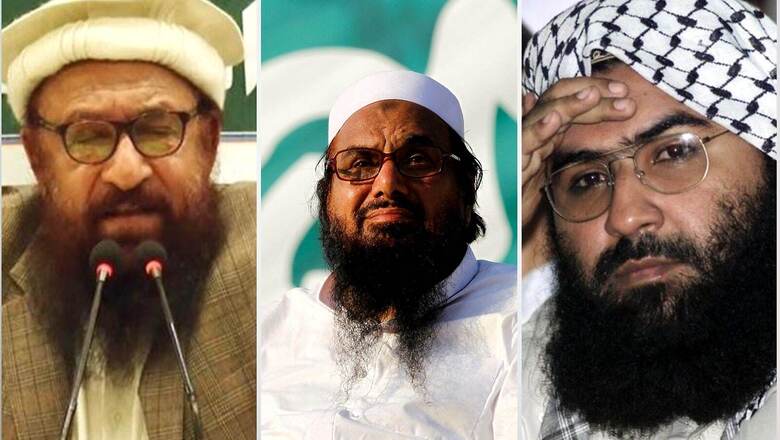'Shielded' by Pak & China's Blocking Spree at UN, A Look at Terrorists in India's 'Most Wanted' List

views
After repeated blocks on bids by India and its allies by Islamabad’s all-weather friend China, deputy leader of Pakistan-based terror outfit Lashkar-e-Taiba (LeT) Abdul Rehman Makki was designated as a global terrorist on Monday by the United Nations, subjecting him to an assets freeze, travel ban and arms embargo.
The UN Security Council’s 1267 Al Qaeda Sanctions Committee added 68-year-old Makki, the brother-in-law of JUD/LeT Chief Hafiz Muhammad Saeed, to its list of designated terrorists on Monday after China withdrew its hold on a joint proposal by India and the US.
Makki is among the many Pakistan-based terrorist that are listed on the National Investigation Agency’s ‘Most-Wanted’ list. As per the NIA website, there are 26 Pakistan natives listed under the Most Wanted category. Not just by India, Pakistan is accused of harbouring global terrorists by many other countries. In December, New Delhi hit out at Islamabad for harbouring UN Designated 126 terrorists and 27 terror groups and mistreating religious minorities. CLICK HERE FOR NIA’S ‘MOST WANTED’ LIST
Take a Look at Terrorists, Some Pak-based, Designated ‘Most Wanted’ by India
1) Abdul Rehman Makki
Abdul Rehman Makki, the rother-in-law of LeT co-founder Hafiz Saeed, was designated as a global terrorist on Monday by the United Nations on Monday and is listed on NIA’s Most Wanted list. Makki, born in Bahawalpur, Punjab Province of Pakistan, is the deputy chief of LeT and head of the political affairs wing of JUD/LeT.
Providing a statement for the reasons of Makki’s listing, the sanctions committee said: Makki and other LeT/JUD operatives “have been involved in raising funds, recruiting and radicalising youth to violence and planning attacks in India, particularly in Jammu and Kashmir (J&K)”. According to a press release, Makki also served as head of LeT’s foreign relations department and member of Shura (governing body).
-China, Pak’s ‘All-weather’ Friend, Still Blocks THESE Terrorists
While Abdul Rehman Makki is now notified, China still blocks four names proposed by India including 26/11 key accused Abdul Rauf, Sajid Mir, Shahid Mehmood and Talha Saeed. Who are these four?
Abdul Rauf Asghar is a terrorist based in Pakistan reportedly involved in the setting up of training camps for the recruitment and training of militants in the country. He is also a key conspirator in the 2001 attack on the Indian Parliament.
Sajid Mir, a top commander for LeT is also accused of involvement in the 26/11 Mumbai attacks in 2008. He is also based in Pakistan.
Shahid Mehmood is reportedly the deputy chief of Falah-i-Insaniyat (FIF) – a banned outfit that is a part of the LeT.
Hafiz Talha Saeed is the Son of LeT founder Hafiz Mohammad Saeed and senior leader in the group. According to a Gazette notification from the Ministry of Home Affairs (MHA), Saeed is the head of the LeT cleric wing and has delivered sermons urging jehad against India and other countries. Saeed is also allegedly involved in fund collection and the planning of attacks by LeT operatives in India and Afghanistan.
2) Hafiz Saeed
Hafiz Saeed, the founder of Pakistan-based terror group Lashkar e Taiba, is known to be the mastermind of the 26/11 attacks in Mumbai in 2008 which left 166 people dead.
Hafiz Saeed, was also involved in the 2000 attack on the Red Fort, 2008 Rampur attack, and 2015 attack on a BSF convoy at Udhampur in Jammu and Kashmir. Hafiz Saeed was among the first four individuals to be designated as a terrorist under the UAPA post its 2019 amendment. At present, he is serving a prison sentence in Pakistan for terror financing.
NIA website says, “Credible information has been received by the Central Government that Hafiz Muhammad Saeed, Amir of Jamaat-ud-Dawah and the secessionist and separatist leaders, including the members/cadres of the Hurriyat Conference, have been acting in connivance with active militants of proscribed terrorist organisations Hizb-ul-Mujahideen (HM), Dukhtaran-e-Millat, Lashkar-e-Taiba (LeT) and other terrorist organisations/associations/gangs for raising, receiving and collecting funds domestically and abroad through various illegal channels, including hawala, for funding separatist and terrorist activities in Jammu and Kashmir through the funds so collected and as such have entered into a larger criminal conspiracy for causing disruption in the Kashmir valley by way of pelting stones on the security forces, systematically burning of schools, damage to public property and waging war against India”.
3) Dawood Ibrahim
Dawood Ibrahim, known as India’s most wanted man and is designated ‘global terrorist’ by the United Nations, has a massive bounty on his head. He started out as a Dongri Don, founded the D-Company in the 1970s and has been involved in drug dealing, money laundering, smuggling as well as gang violence and terrorist activities since then. Dawood was involved in the 1993 Bombay bomb blasts that left 257 dead after 13 bombs were set off at multiple locations across the city, including the Air India headquarters, Bombay Stock Exchange, and the Shiv Sena office. He has also been placed on the FBI and Interpol’s Most Wanted lists.
Though not a native of Pakistan, several reports and accounts over the last few years have suggested that Dawood Ibrahim is in Pakistan. Last year, a witness in the money-laundering case against NCP minister Nawab Malik has told Enforcement Directorate that Iqbal Kaskar had told him that his older brother, fugitive terror accused Dawood Ibrahim, who is based in Pakistan, sends Rs 10 lakh to his siblings every month.
The claims of Dawood being in Pakistan resurfaced again on Tuesday, January 17, with the fugitive’s nephew disclosing shocking details during an interrogation by the NIA. News18 has learnt that Alishah Ibrahim Parkar, son of Dawood’s late sister Haseena Parkar, told the anti-terror probe agency that the wanted criminal is staying in the defense area of Pakistan’s Karachi near Abdulla Gazi Baba Dargah. Alishah also revealed that Dawood got married for the second time and his second wife is of Pathan origin.
4) Maulana Masood Azhar
Masood Azhar is the founder and chief of Jaish-e-Mohammed and was a key conspirator in the 2001 attack on the Indian Parliament which led to the deaths of 14 people, including five terrorists, and the escalation of tensions between India and Pakistan. Masood Azhar was also allegedly involved in the 2016 Pathankot attack and the 2019 attack on a CRPF convoy in Pulwama that led to the death of 44 CRPF personnel.
Last year, in an exclusive telephonic interview with CNN-News18, Taliban spokesperson and face of Taliban Suhail Shaheen denied the presence of terror outfit Jaish-e-Mohammed’s chief Maulana Masood Azhar in Afghanistan, warning Pakistan “not to make claims without evidence”. This was after Pakistan, in a move that was termed “hogwash” by India, wrote a letter to Afghanistan to arrest. Azhar, a UN-designated terrorist, is India’s most wanted.
The summary of allegations on Masood Azhar on NIA website reads: “Central Government has received information that a case FIR No. 20/2019 dated 14.02.2019 has been registered at PS Awantipora, Jammu & Kashmir under sections 302 & 307 of Ranbir Penal Code, section 3 of Explosive Substance Act and sections 16,18 and 20 of the Unlawful Activities (Prevention) Act, 1967, regarding the attack on CRPF convoy, which was on its way from Jammu to Srinagar, at Lethpora on National Highway by Jaish-e-Mohammed (JeM) terrorists with explosive laden vehicle, in which 40 CRPF personnel attained martyrdom and a number of them were grievously injured”.
Holding “absconding” status, Masood Azhar has been booked under Sections 302 & 307 of Ranbir Penal Code, section 3 of Explosive Substance Act and sections 16,18 and 20 of the Unlawful Activities (Prevention) Act, 1967 by the NIA. The date of registration of case against Azhar as per NIA website is February 20, 2019.
5) Zaki-ur-Rehman Lakhvi
Zaki-ur-Rehman Lakhvi, a senior leader in LeT, has been sentenced to life in prison for terror financing. He is also accused of being involved in the 26/11 and Indian Parliament attacks. He is also known as Abu Waheed Irshad, Ahmad Arshad, Kaki Ur-Rehman, Zakir Rehman Lakhvi. Lakhvi has been accused by India and the US of orchestrating the 2008 Mumbai terror attacks. He was sentenced in January 2021 to three concurrent five-year sentences.
The court found Lakhvi guilty of collecting and dispersing money for terrorist attacks by Lashkar-e-Taiba.
Repeated Attempts by China to Block UN Listing of Pak Terrorists
LeT leader Makki’s listing on Monday comes seven months after China, a close ally of Pakistan, had put a hold on June 16, 2022 on a joint proposal by India and the US to designate him.
While China gave up this time, bringing the head of the political affairs wing of JuD/LeT and the brother-in-law of LeT chief Hafiz Muhammad Saeed in the UN blacklist, it has used technical tools multiple times to block listing of Pakistan-based terrorists.
China in October last year again put on hold efforts of India and the US to blacklist Hafiz Talah Saeed, the son of Lashkar-e-Taiba supremo Hafiz Saeed at the United Nations. This was the fifth instance in four months where China tried to spoil the terrorist designation bid of India and the US. As per reports, China objected to add the name of Hafiz Talah Saeed under the 1267 Al Qaeda Sanctions Committee of the UN Security Council.
Under the United Nations Security Council’s 1267 Al Qaeda Sanctions Committee regime, any UN member state (China is one of the charter members of UN) can propose the name of an individual or group to be designated as a terrorist. Decisions are made by consensus in the 1267 Sanctions Committee, which comprises all members of the UNSC.
A committee member can block blacklisting proposals by raising objections or putting a “technical hold” on a proposal.

















Comments
0 comment